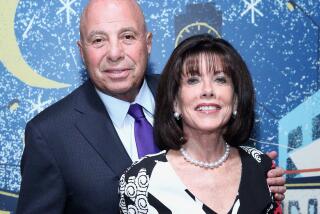The Rise and Fall of a Golden Anchor
Not all Miss America contestants aspire to be brain surgeons.
Five of 10 finalists in the 1984 pageant said they wanted to be TV anchorwomen, Alanna Nash reports in “Golden Girl,” her coming book about the swift rise and swifter fall of the late Jessica Savitch, whose flash success at NBC probably had legions of young women dreaming of glamorous jobs in newscasting.
Scheduled for release in August or September, Nash’s book is one of two on Savitch. The just-published “Almost Golden” by Gwenda Blair also reveals a grim, unstable, tragic and ultimately pathetic Savitch behind the appealing mask displayed to viewers.
These literary post-mortems are more evidence of publishing’s extended tryst with the broadcast industry. At least this time the subject is not CBS, but a sad, ambition-driven woman who was beset by deep insecurity, paranoia, depression, marital disasters (her second husband hanged himself) and alleged drug addiction.
On a broader level, Savitch’s story is one more example of how TV executives too often sell news by selling the personalities who deliver news. According to Nash and Blair, Savitch the credible NBC News journalist was fantasy.
You can just imagine what went through the minds of all those potential junior Jessicas as they watched their heroine: Oh, to be like her, so alluring, so magnetic, so confident and authoritative. So golden.
Her admirers had no way of knowing the truth--that the all-American woman on the screen was a fraud.
“She wanted to be famous, (to use anchoring) as a means to that end,” former NBC News President Reuven Frank tells Blair. “But people are in the news business as an end, not a means.”
At least they should be.
There will always be room for thespians in some TV newsrooms. But few, if any, have been so fouled up or have had network careers that better exemplified the worst of newscasting.
“She was smart,” Nash said. “But she had no value system to balance out her ambition.”
Savitch was only 30 when hired by NBC News as a weekend anchor in 1977 after a sizzling local news career at KHOU in Houston and KYW in Philadelphia. No matter that she wasn’t qualified for network-level journalism. NBC and its affiliate stations saw in Savitch all the qualifications they needed to see. They saw ratings points.
By the time of her death in an auto accident six years later, however, she was washed up, a casualty of both her own self-destructive behavior and a network that hired her for her performance skills, only to virtually abandon her for not having reporting skills.
For a while, the illusion worked. Even while resented by many of her more experienced, more talented NBC News colleagues, the grand imposter was impressing viewers with her mannered delivery.
“Jessica seemed to be the ideal wedding of beauty and brains,” Nash said by phone from her home in Louisville, Ky. “She was the role model for a lot of women. She seemed to know what she was talking about.”
Seemed is always a key word in shell games.
Savitch was hired when Dick Wald was the president of NBC News; she seemed to lose favor under each of his successors.
Taking over the news division a second time in 1982, that crusty, acerbic NBC veteran Frank saw in Savitch a “bubblegum-news, non-journalism . . . chatty sex object who was emblematic of the growing trivialization of the great tradition of Edward R. Murrow,” Blair writes. “In Frank’s view, the only people who thought Savitch was a great journalist were those salesmen who ended up being affiliate (station) managers.”
On the phone from New York, Frank reaffirmed that impression of Savitch. “She was not interested in news,” he said. “At best, news was her vehicle. She had no skills. She couldn’t write very well. Her reporting was undistinguished. She was merely somebody who did well on camera. She didn’t have to be on news. She could have been on ‘Entertainment Tonight.’ ”
But she was on news, amazingly--moving on at NBC to the prestigious Senate beat, where she bombed, and later becoming podium reporter at the 1980 presidential nominating conventions, where she also bombed.
“The fault (for Savitch’s failure) has to be shared equally,” Nash said. “If she used the network to become famous, the network used her the same way. All through her career in Houston and Philadelphia, she had a backup support system, people to hold her hand. When she got to NBC, there was no one to back her up. You can’t blame NBC for that, but you can blame NBC for putting her into situations that she wasn’t qualified for.”
The later, tortuous stages of Savitch’s career were a tribute to fiscal and human waste. Paradoxically, she was making a handsome $315,000 a year when she died, but she had hit bottom and was relegated by Frank to reading 43-second news updates, all the while withdrawing into what Blair terms the “pathology of stardom.”
Savitch’s ever-shrinking professional world was dominated by a corps of doting personal attendants--groomers, wardrobe helpers and secretaries--who Blair says formed a “warm, unthreatening, loyal wall between her and the increasingly hostile world outside.”
She paid their salaries. So they devoted all their attention to Savitch, giving “total concentration on such matters as new eye-shadow possibilities, a piece of jewelry she might wear on the air, whether her hair needed bleaching,” Blair writes about TV’s most-coddled 43-second news reader. “All this was examined and debated and discussed in endless detail.”
Blair also recalls the time a glazed, hazy Savitch cracked up on the air during one of her news updates, and Blair and Nash each describe Savitch’s alleged cocaine dependence.
Nash says she traced the cocaine usage to Savitch’s fledgling TV news days in Houston. “She got so weirded out on cocaine, her addiction was in full (swing),” Nash said. “By 1980, she was snorting from morning till night. She was so paranoid by that time that sometimes she wouldn’t go in to work. But this was someone who had more than a drug problem. She had a severe personality disorder. Right before she died, she was in dreadful physical shape. Her weight was low, her hair and nails were ragged, she had ulcerated sores from the drugs and her hands were shaking.”
For fleeting moments on the screen, however, she remained Jessica Savitch of NBC News--the vision, the dream, the illusion.
More to Read
The complete guide to home viewing
Get Screen Gab for everything about the TV shows and streaming movies everyone’s talking about.
You may occasionally receive promotional content from the Los Angeles Times.






